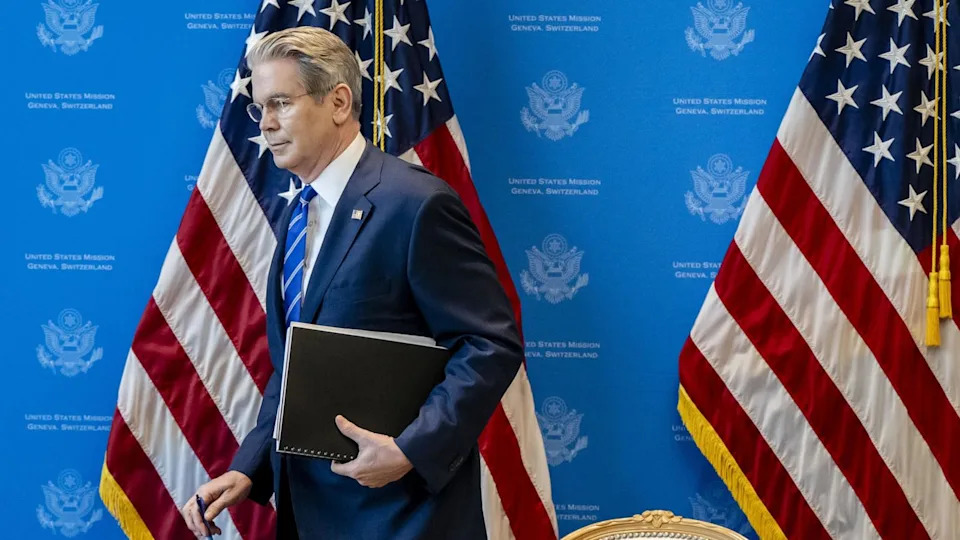Recession alarms blared across Wall Street in the aftermath of President Donald Trump’s “ Liberation Day ” tariff announcement last month, but a recent trade agreement between the U.S. and China has dialed back many of those warnings.
JPMorgan on Tuesday lowered its odds of a recession this year from 60% to below 50%, meaning the U.S. is more likely to grow in 2025 than enter a downturn. Similarly, Goldman Sachs reduced its chances of a recession this year from 45% to 35%.
Stock market gains reflected such optimism. The S&P 500 soared in the immediate aftermath of the U.S.-China agreement, shrugging off previous tariff-induced losses and bringing the index into positive territory for 2025.
The accord between the world’s two largest economies slashed U.S. tariffs on Chinese goods from 145% to 30%, while cutting Chinese levies on U.S. products from 125% to 10%.
MORE: Trump admin live updates: Trump participates as Boeing, Qatar sign deal amid plane flap
The previous set of sky-high tariffs had threatened a surge in prices, a disruption of global trade and a possible U.S. recession.
“The risk of a recession over the next 12 months looks substantially lower following the tariff cuts,” Bill Adams, chief economist for Comerica Bank, told ABC News in a statement.
The drawdown of U.S.-China tariffs marks the latest softening of Trump’s levies.
The White House last month paused far-reaching “reciprocal tariffs” on dozens of countries, just hours after the measures took effect. Trump has also eased sector-specific tariffs targeting autos, and rolled back duties on some goods from Mexico and Canada.
“These massive tariff reductions at this time likely take a recession off the table for now,” Dan Ives, a managing director of equity research at the investment firm Wedbush, told ABC News in a statement on Monday.
Still, an array of tariffs remain in place. An across-the-board 10% levy applies to imports from nearly all countries. Additional tariffs have hit auto parts, as well as steel and aluminum.
Even after the pullback, a 30% tariff on China far exceeds the level before Trump took office, posing a risk of price increases for a large swathe of products that includes apparel, toys and some electronics.
The rollback of levies on Chinese goods is expected to reduce the average cost of tariffs per household nearly by half but the cost burden will still reach $2,800 in 2025, the Yale Budget Lab found.

Federal Reserve Chair Jerome Powell warned last week of a possible tariff-induced bout of “stagflation,” a term that describes a rise of inflation alongside a slowdown of the economy.
Under such a scenario, the central bank could face difficulty as it weighs a choice between lower rates intended to boost the economy or higher rates aimed at easing inflation.
"If the large increase in tariffs that have been announced are sustained, they're likely to generate a rise in inflation and a slowdown of economic growth," Powell said. "All of these policies are evolving, however, and their effects on the economy remain highly uncertain."
MORE: What's in the US-China trade framework?
For now, the economy has defied inflation fears. Inflation eased in the aftermath of the tariff escalation last month, reaching its lowest level since 2021, government data on Tuesday showed.
The path forward for tariffs remains uncertain, however, clouding the economic outlook, some analysts told ABC News.
The lowered U.S.-China tariffs will remain in place for 90 days while the two sides negotiate a wider trade deal. The White House says it has launched trade discussions with dozens of countries in an effort to strike trade agreements before a pause of the "reciprocal tariffs" lifts in July.
"Will the unpredictable nature of U.S. policy continue or are we now on a more conventional path?" Jim Reid, a strategist at Deutsche Bank Research, said in a note to clients this week, just hours after the U.S. and China announced the trade agreement. "Not sure I have the answers."
Recession warnings fade after Trump rolls back tariffs originally appeared on abcnews.go.com

